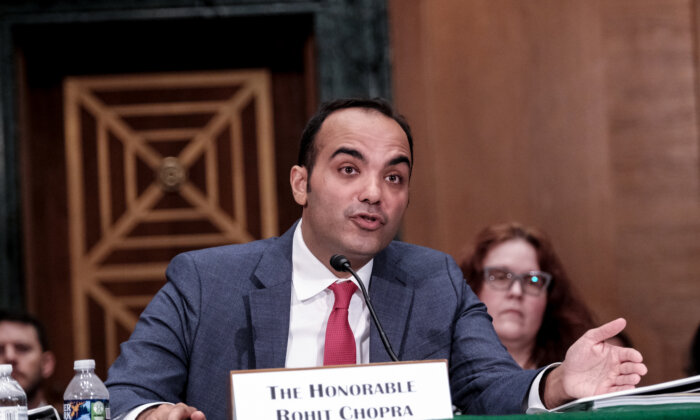Chopra resigns as CFPB director, concluding a tenure marked by aggressive regulation and scrutiny of the agency.
Rohit Chopra, director of the Consumer Financial Protection Bureau (CFPB), on Saturday announced his departure from the agency, which has faced criticism from Republicans and others over claims of regulatory overreach, along with constitutional challenges to its existence.
Chopra made the announcement in a letter to President Donald Trump that he also shared on social media on Feb. 1.
“I hope that the CFPB will continue to be a pillar of restoring and advancing economic liberty in America, and I wish you good luck in serving our great country,” wrote Chopra, an appointee of President Joe Biden who championed a robust CFPB to tackle financial industry excesses and shield consumers from predatory practices.
“We’ve led efforts across the government to stop the scourge of junk fees in banking and across sectors of the economy, to tame the harmful impacts of medical bills riddled with errors, and to limit the creep of surveillance by data brokers that puts our sensitive data in the hands of foreign adversaries,” Chopra wrote.
He added that the CFPB has also “put forth policies to block financial firms and technology giants from debanking and deplatforming Americans based on their speech or religious views, while also restoring freedom and other individual rights,” in a possible nod to criticism from Republicans and Trump that some financial institutions have denied services to customers for the conservative political views.
The White House did not immediately respond to a request for clarification on whether Chopra had been fired by Trump and whether the president plans to appoint an interim director before nominating Chopra’s replacement for the position, which is subject to Senate confirmation.
Since its inception in 2011, Republicans have viewed the CFPB as an overreaching and unaccountable agency. Chopra, a close ally of Sen. Elizabeth Warren (D-Mass.), was known for his aggressive regulatory agenda, which the next director is likely to review.
Warren, who championed the creation of the agency, issued a statement on Feb. 1 regarding Chopra’s departure, vowing to oppose any efforts to “destroy the agency.”
“Under Rohit Chopra’s leadership, the CFPB is holding Wall Street accountable for cheating hard-working families and preventing the de-banking of Americans across the country, including consumers locked out of the financial system due to overdraft fees, religious organizations, and conservatives,” Warren wrote.
Echoing the position expressed in Chopra’s letter that the CFPB’s mission aligns with some of Trump’s objectives, Warren warned against efforts to dismantle the agency.
“President Trump campaigned on capping credit card interest rates at 10 [percent] and lowering costs for Americans,” she wrote. “He needs a strong CFPB and a strong CFPB Director to do that. But if President Trump and Republicans decide to cower to Wall Street billionaires and destroy the agency, they will have a fight on their hands.”
Chopra’s departure comes amid long-standing legal and political battles over the CFPB’s authority, with critics targeting its leadership structure and its role in regulating the financial industry.
In 2019, a lawsuit challenged the constitutionality of the CFPB, with House Republicans arguing its leadership structure violated the separation of powers. In June 2020, the U.S. Supreme Court ruled that the CFPB’s structure was unconstitutional but allowed the agency to continue operating, requiring its director to be removable by the president at will.
More recently, some in Trump’s orbit have challenged the consumer watchdog agency’s existence. Elon Musk, who heads the Department of Government Efficiency (DOGE) initiative that Trump has tasked with leading the effort to cut government expenditures and roll back bureaucracy, recently called for the CFPB to be abolished.
“Delete CFPB,” Musk wrote in a post on X. “There are too many duplicative regulatory agencies.”

